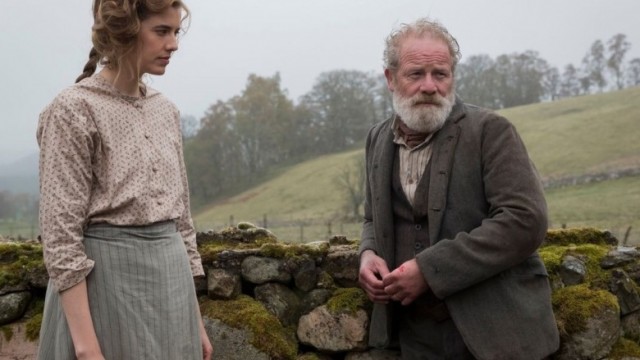Terence Davies can’t make a movie that’s not ultimately about himself. Sunset Song is simultaneously an elegy to a long forgotten era of farming class Scotland and an ode to the country while also being a film with autobiographical elements that informs just how rough Davies had it. Clearly, he’s working out his demons on screen even if he’s supposed to be making a film about everything else. That battle with self-indulgence and melodramatic trope abuse leads to some of the least endearing tripe with the most gorgeously romantic visuals this side of Terrence Malick.
Davies adopts a complex grandfatherly tone of wistful brutality to tell the maturation story of Chris Guthrie, a hard working and intelligent daughter of a poor tough-as-nails abusive father who repeatedly rapes his wife pregnant and physically abuses his children, including her older brother and two much younger children. At the beginning of the film, she’s torn between her love of the land and her love of books (she can speak French AND Latin!!), having her hand forced by the birth of an unwanted fifth child, followed by the death of her parents.
Ultimately, Sunset Song is a compendium of miserablist period melodrama tropes told in a most yearning manner. Hard working the soil. Sexual assault. Physically abusive, demanding, father. Suicide. Greedy aunt/uncle. Runaways. War. Giving up dreams. Courting by multiple suitors. Marriage. Changed personalities. Weddings. Folk songs (so many folk songs). Crying. Asshole men. Woman finding strength through adversity. Swooning images of fields and land. A softly spoken voice over. It’s all there. If you had a set of bingo cards, every box would be filled by the end.
All of this might be forgiven if this was delivered in any meaningful manner, but everything is decimated by Davies’ dedication to time and image. One of his purposes is to show how time used to pass slowly before modernization sped life along. Which, to Davies, means long slow deeply meaningful speech patterns with pauses that stretch for eternity. A couple of scenes had dialogue with pauses so long it felt like Davies intended the line readings to be cut for a reaction shot but forgot to film the pickup footage. Folk songs stretch on forever, culminating in an ode to bagpipes. There’s even inexplicable third act personality switches that flip fast enough to give you whiplash.
That’s not to say it’s all bad. Davies’ 65mm cinematography looks like it should be astounding on a big enough screen with a 70mm print struck. Unfortunately, the film is being struck on DCP, and the lush detail is almost lost in the digital harshness. The digital interiors, filmed with a harsher reality, fare a touch better. The acting is generally great, if you like the measured intensity of period piece melodrama. The writing isn’t all bad, even if few of the episodes ever quite match each other.
Many people will be won over by the Malickian exterior cinematography, the dirt-in-their-eyes dedication to hard working misery, the wistfully complex tone, the many folk songs, the yearning to a time gone by, and the ode to a land forgotten. If that’s your cup of tea, this movie is fantastic. But, I couldn’t help but wish I was rewatching the new edition of Far From the Madding Crowd or another Thomas Hardy adaptation that knows how to measure irony, wit, and the joy of life with the old timey story hour without sacrificing pacing or editing.


